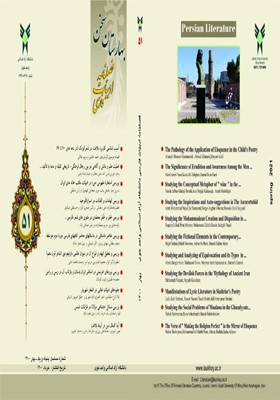The Verse of " Making the Religion Perfect " in the Mirror of Eloquence
Subject Areas : Abstract Articles
Mahin Shahrivar
1
,
Mohammad Ali Rabbi Pour
2
*
![]() ,
Alireza Radbin
3
,
Sadra Alipour
4
,
Alireza Radbin
3
,
Sadra Alipour
4
1 - PhD Student, Department of Quran and Hadith, Urmia Branch, Islamic Azad University, Urmia, Iran.
2 - Department of Quran and Hadith Sciences, Tabriz Branch, Islamic Azad University, Tabriz, Iran
3 - Department of Quran and Hadith Sciences, Tabriz Branch, Islamic Azad University, Tabriz, Iran.
4 - Department of Quran and Hadith Sciences, Mako Branch, Islamic Azad University, Mako, Iran
Keywords: eloquence, Keywords: Sureh Maedeh, make the religion perfect, tasbigh ( the harmony of top with the bottom,
Abstract :
Abstract The Holy Qur'an in the appearance, is formed with simple words, but there are deep implications in them. The effect of eloquence to express the meaning of the Glorious Qur'an is conspicuous. Regarding the harmony and inter-relationship of the verses in the Qur'anic interpretation have constructive and valuable benefits; including understanding of exquisite and tender points of the Qur'anic miracle, true finding out of the geometric construction of verses, firm content of the Holy Qur'an which is full of the advantages of verbal, spiritual, and literary arrays . These eloquence of style and standard with the special choice have been used in the verses and chapters. It has unequaled fluency and eloquence in the three settings of expression miracles, scientific miracles, and religious tradition miracles. Regarding the point that the beginning and ending of the verse 3 " Maedeh " is about the sanction of edibles, does the verse " perfection of the religion " which is located among the sanctions, and by itself is an appositive, from the beginning to the end, have any relationship? The Shiite scholars believe that the verse " perfection of the religion is appositive and doesn't have fitness with its beginning and ending and is about the imamate of Ali ( pbuH ). The Sunni scientists believe that the Shiite researchers have looked at this verse without paying attention to the items around them, and the aim of " I perfected the religion to you today " is the perfection of religious percepts, not other things. In this paper, by taking advantages of eloquence and tasbigh ( the harmony of the top with its bottom ) and studying and analyzing the beginning and ending of the verse, we have tried to find the fact.
فهرست منابع و مآخذ
الف: کتابنامه
ب - مقالات
_||_

